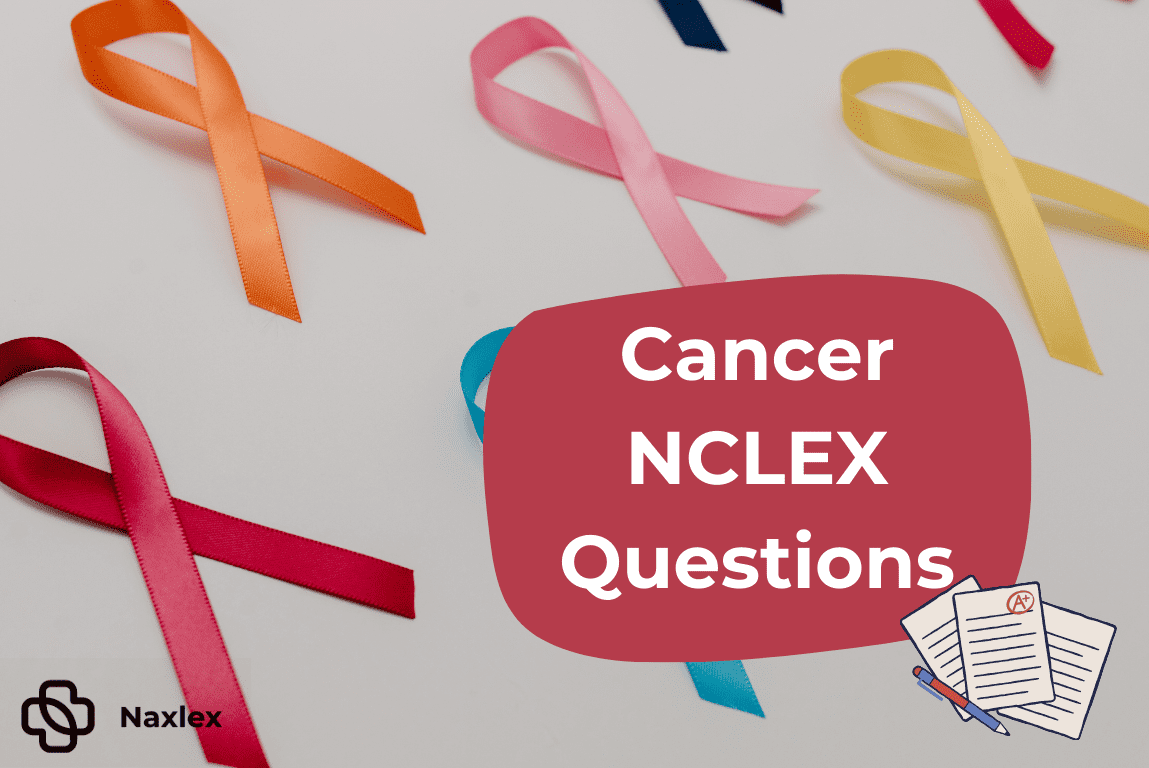Free NCLEX 14-day Free Trial
Try some exam questions on the NCLEX!
Cancer NCLEX Questions
Keeping current with the latest knowledge and skills is essential in nursing and healthcare. The NCLEX (National Council Licensure Examination) is a big nurse test. It checks if they have the right skills to provide safe and effective care to patients. One crucial area covered in the NCLEX is cancer, also known as oncology. With the cancer cases increasing daily, you should prepare adequately for cancer NCLEX questions.
In this article, we'll discuss what to expect on cancer NCLEX questions and the topics you will examine in the cancer category. Also, look at a few Naxlex NCLEX cancer questions from our test bank and practice questions.
Explore the world of oncology with Naxlex NCLEX! Explore our comprehensive study resources, including electronic flashcards, practice tests, and a vast NCLEX cancer test bank. Whether you are a nursing student or a healthcare professional, Naxlex NCLEX equips you with the knowledge and skills needed to excel in cancer care. Our study materials are designed by highly skilled tutors who underwent NCLEX and passed. Take the first step towards mastering cancer NCLEX questions and expanding your expertise. Start your journey with Naxlex NCLEX today.

Cancer is a condition characterized by the uncontrolled growth and spread of abnormal cells in the body, often stemming from genetic changes that disrupt normal cell function, particularly in development and division. Typically, cells undergo a regulated process of division to replace old or damaged cells. However, in cancer, these cells proliferate uncontrollably, forming tumors that can be:
- Cancerous (malignant)
- Non-cancerous (benign)
Malignant tumors can invade nearby tissues and metastasize to other parts of the body, while benign tumors typically remain localized and do not spread. Cancer can affect various organs and tissues, with over a hundred types identified, generally named after the affected area or the type of cell involved.
Let us look at the types of cancers
- Carcinoma
Carcinomas are the most common type of cancer. These are formed by epithelial cells covering a body's inside and outside surfaces. Adenocarcinoma is a cancer in epithelial cells that produce fluids and mucus. Basal cell carcinoma is a cancer that forms in the lower or basal layer of the epidermis, a person's outer layer of skin.
Squamous cell carcinoma is cancer that forms in the squamous cells, which are epithelial cells that lie beneath the skin's outer surface. Transitional cell carcinoma is a cancer that forms in a type of epithelial tissue called transitional epithelium or urothelium. This tissue is found in the linings of the bladder, part of the kidneys, ureters, and a few other organs.
- Sarcomas
Sarcomas are malignancies originating in either bones or soft tissues, with osteosarcoma being the predominant type affecting bone tissue.
- Lymphoma
Lymphoma is a type of cancer that develops from either T or B cells, both lymphocytes. It leads to the accumulation of abnormal lymphocytes in lymph nodes and lymphatic vessels.
- Leukemia
Leukemias are cancers originating in the blood-forming tissue found in bone marrow. They result in the proliferation of abnormal white blood cells within the bloodstream and bone marrow, displacing healthy blood cells.
- Multiple Myeloma
Multiple myeloma is a malignancy from plasma cells, a subset of immune cells. These aberrant plasma cells, known as myeloma cells, accumulate in the bone marrow and generate tumors in bones throughout the body.
- Melanoma
Melanoma is a type of cancer originating from cells that develop into melanocytes, specialized cells responsible for producing melanin. While most melanomas arise on the skin, they can also occur in other pigmented tissues, including the eye.
Naxlex Cancer NCLEX Question Test Bank
Naxlex NCLEX provides a comprehensive collection of cancer NCLEX questions, covering various cancer types, their assessment, treatment strategies, symptom control, and coordination with other healthcare providers.
Let us look at the questions you will find on our cancer test bank or practice questions
Question: 1
Which type of cancer originates from the cells that produce melanin?
A) Sarcoma
B) Leukemia
C) Melanoma
D) Lymphoma
Answer: C) Melanoma
Explanation: Melanoma is a type of cancer that develops from melanocytes, the cells responsible for producing melanin, the pigment that gives skin its color.
Question: 2
Which symptom is commonly associated with leukemia?
A) Difficulty swallowing
B) Unexplained weight gain
C) Easy bruising and bleeding
D) Persistent cough
Answer: C) Easy bruising and bleeding
Explanation: Leukemia often leads to low levels of normal blood cells, particularly platelets, necessary for blood clotting. This can cause bruising and bleeding.
Question: 3
What is the most common site for the formation of osteosarcoma?
A) Lungs
B) Brain
C) Bones
D) Liver
Answer: C) Bones
Explanation: Osteosarcoma is the most common type of bone cancer, typically forming in the long bones of the arms and legs.
Read More
Question: 4
Which type of cancer can form tumors in the lymph nodes?
A) Sarcoma
B) Leukemia
C) Lymphoma
D) Melanoma
Answer: C) Lymphoma
Explanation: Lymphomas are lymphatic system cancers, including lymph nodes. They often result in the formation of tumors within lymph nodes.
Question: 5
What is a characteristic feature of multiple myeloma?
A) Formation of tumors in the lungs
B) Accumulation of abnormal plasma cells in the bone marrow
C) Excessive production of red blood cells
D) Presence of abnormal skin pigmentation
Answer: B) Accumulation of abnormal plasma cells in the bone marrow
Explanation: Multiple myeloma is characterized by the proliferation of abnormal plasma cells in the bone marrow, leading to bone pain, weakened bones, and other symptoms.
Conclusion
Now that you've had a glance at Naxlex NCLEX cancer questions, are you ready to conquer cancer NCLEX questions? Join the Naxlex NCLEX community and elevate your understanding of oncology. Our curated study materials and interactive quizzes deeply dive into critical aspects of patient care, from diagnosis to palliation of cancer patients. Gain confidence, broaden your horizon, and ace challenging NCLEX cancer questions with Naxlex NCLEX. Don't wait any longer – empower yourself with the tools to succeed in NCLEX cancer and oncology. Enroll now and unlock your potential with Naxlex NCLEX at a student-friendly price.
Check out Naxlex LPN Study Guide.
Pass on the first time!
Struggling to pass the NCLEX exam?
With questions that are almost 90% similar to actual
exams
you will be guaranteed to
pass it on first try .

FAQs
If you use the Nursing test guide PDF, you will enjoy features like:
Images
for effective visual learning
Summarized detailed topics
Quick
reading with footnotes
Questions to help you study through
trial and error
Get
ready for the Nursing with confidence
